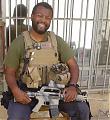Since you were a professional in both services, this is a unique opportunity. Army leadership doctrine and Marine Corps leadership doctrine are night and day. You would have referred to FM 6-22's predecessor, FM 22-100. And you would probably have known MCWP 6-11 as FMFM 1-0. What do you think about the differences between the two? What did you do to employ either of them during your period of service?












 . One book that does have some good examples of analysis is
. One book that does have some good examples of analysis is 

Bookmarks